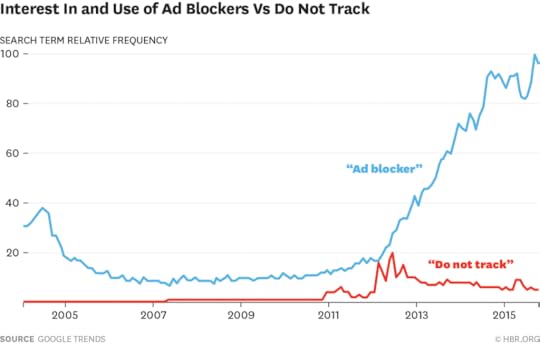Time for advertising to call off the dogs

Is this the way you want your brand to look?
Digital advertising needs to sniff its own stench, instead of everybody’s digital butts.
A sample of that stench is wafting through the interwebs from the Partnership for Responsible Addressable Media, an ad industry bullphemism for yet another way to excuse the urge to keep tracking people against their wishes (and simple good manners) all over the digital world.
This new thing is yet another granfalloon conjured by the Association of National Advertisers, a granfalloon itself, and announced today, in the faux-news style of the press release (which it no doubt also is) at the first link above. It begins,
AD INDUSTRY LAUNCHES “PARTNERSHIP FOR RESPONSIBLE ADDRESSABLE MEDIA” TO ENSURE FUTURE OF DIGITAL MEDIA FOR BUSINESSES & CONSUMERS
Governing Group of Industry Leaders Includes 4A’s, ANA, IAB, IAB Tech Lab, NAI, WFA, P&G, Unilever, Ford, GM, IBM, NBCUniversal, IPG, Publicis, Adobe, LiveRamp, MediaMath, The Trade Desk
NEW YORK (August 4, 2020) — Leading trade associations and companies representing every sector of the global advertising industry today joined together to launch the Partnership for Responsible Addressable Media, an initiative to advance and protect critical functionalities like customization and analytics for digital media and advertising, while safeguarding privacy and improving the consumer experience. The governing group of the Partnership will include the most influential organizations in advertising.
I learned about this from @WendyDavis, who wrote this piece in MediaPost. NiemanLab summarizes the news in a tweet that reads, “A new ad-industry group will lobby Google and Apple to let them track users just a wee bit more, please and thank you.”
Writes Wendy,
The group will soon reach out to browser developers and platforms, in hopes of convincing them to rethink recent decisions that will limit tracking, according to Venable attorney Stu Ingis, who will head the legal and policy working group.
“These companies are taking huge positions that impact the entire economy — the entire media ecosystem — with no real input from the media ecosystem,” Ingis says.
As if the “entire media ecosystem” doesn’t contain the billions of humans being tracked.
Well, here’s a fact: ad blocking, which was already the biggest boycott in world history five years ago, didn’t happen in a vacuum. Even though ad blockers had been available since 2004, use of them didn’t hockey-stick until 2012-13, exactly when adtech and its dependents in publishing gave the middle finger to Do Not Track, which was nothing more than a polite request, expressed by a browser, for some damn privacy while we go about our lives online. See this in Harvard Business Review:

Here’s another fact: the browser makers actually care about their users, some of whom are paying customers (for example with Apple and Microsoft). They know what we want and need, and are giving it to us. Demand and supply at work.
The GDPR and the CCPA also didn’t happen in a vacuum. Both laws were made to protect citizens from exactly what adtech (tracking based advertising) does. And, naturally, the ad biz has been working mightily to obey the letter of those laws while violating their spirit. Why else would we be urged by cookie notices everywhere to “accept” exactly what we’ve made very clear that we don’t want?
So here are some helpful questions from the world’s billions to the brands now paying to have us followed like marked animals:
Have you noticed that not a single brand known to the world has been created by tracking people and aiming ads at them—even after a $trillion or more has been spent on that?
Have you noticed that nearly all the world’s major brands became known through advertising that not only didn’t track people, but sponsored journalism as well?
Have you noticed that tracking people and directing personalized messages at them is in fact direct marketing, which we used to call junk mail ?
Didn’t think so.
Time to get the clues, ad biz. Brands too.
Maybe start with The Cluetrain Manifesto, which says, if you only have time for one clue this year, this is the one to get…

That year was 1999.
If ya’ll had bothered to listen back then, you might not be dealing today with the GDPR, the CCPA, and the earned dislike of billions.
But it’s never too late. (Well, maybe it is, but for now let’s pretend it’s not.)
Maybe, after reading Cluetrain, you can also learn (or re-learn) the difference between real advertising and the junk message business. Find that lesson in Separating Advertising’s Wheat and Chaff. Also in the pretty much everything Bob Hoffman‘s been saying for decades—and better than I’ve been putting it here.
Bottom line: wake up and sniff your own stench.
Doc Searls's Blog
- Doc Searls's profile
- 11 followers



